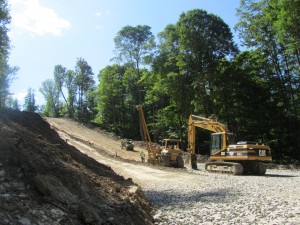Environmental groups ask feds to reconsider Constitution Pipeline
-
Katie Colaneri

Kim Paynter / WHYY/Newsworks
Bulldozers clear land for a Marcellus Shale gas pipeline in Northeast Pennsylvania.
Environmental groups are asking federal regulators to reconsider their decision to approve a new pipeline that would deliver natural gas from Northeast Pennsylvania to markets in New York and New England.
The Constitution Pipeline got the green light in early December, but Moneen Nasmith, an attorney representing the environmental groups, says the Federal Energy Regulatory Commission (FERC) did not consider all the ways constructing the line could hurt the forests it would pass through.
“One of the really important things about forests is just how large they are,” said Nasmith, who works for the nonprofit environmental law firm Earthjustice. “There are a lot of species that require a certain amount of forested area, and when you start chopping it up into little pieces, that forest loses the ability to sustain important species.”
The Constitution project involves building 124 miles of new 30-inch-diameter pipeline, starting in Susquehanna County, Pennsylvania and passing through four counties in the rural Southern Tier of New York where it will hook up with other transmission lines.
Proponents of the project have said that the environmental concerns can be minimized and must be balanced with consumers’ needs for cheap energy, especially in cold winter months.
According to FERC’s order to approve the pipeline earlier this month, the project will cross 36 miles of interior forest, a habitat for migratory birds and other wildlife:
Constitution attempted to route its pipeline adjacent to previously disturbed areas and outside of forested areas where possible. However, impacts on the interior forest habitat and on the migratory birds and other wildlife that use this habitat still account for about 43 percent of the total forest land impacts and about 24 percent of the total project land impacts.
The environmental groups have asked for a new hearing on the pipeline to review these impacts. Nasmith said it is the first step toward filing a lawsuit to halt the project.
In the meantime, she said the groups are hopeful FERC will agree to widen the scope of its environmental review, including the impact of increased drilling to supply natural gas for the pipeline.
“The pipeline requires wells to be there and will likely over the life of the pipeline require more drilling and that is something FERC has refused to consider in its analysis,” Nasmith said.
A federal appeals court ruled in June that federal regulators should consider the cumulative environmental impacts of multiple upgrades to the same system. However, it is unclear whether FERC should also consider upstream activities it does not regulate when evaluating pipelines.
The commission has 30 days to respond to the group’s petition. A spokeswoman said FERC does not comment on pending matters.
A spokesman for the Constitution Pipeline did not immediately return a call seeking comment.
















